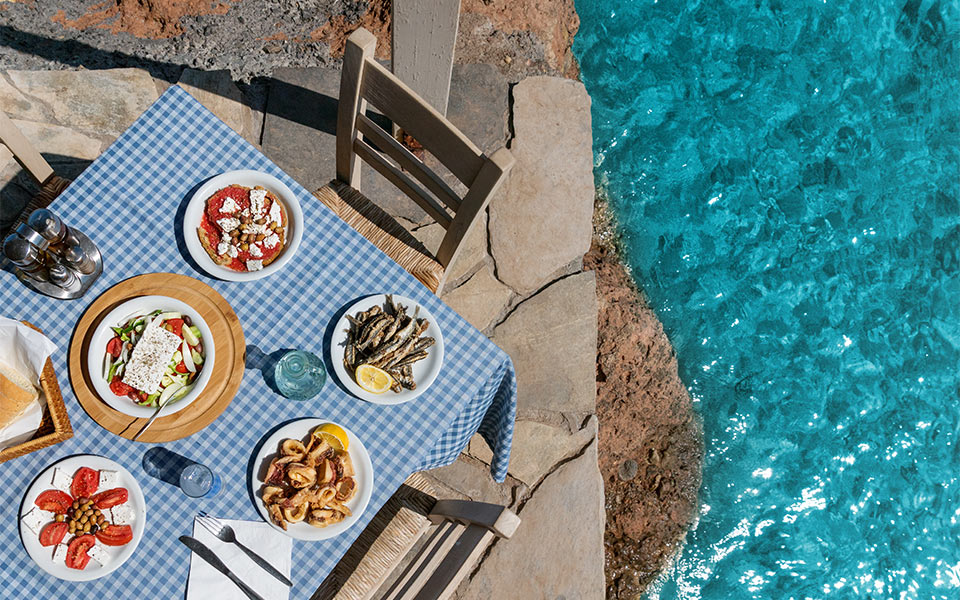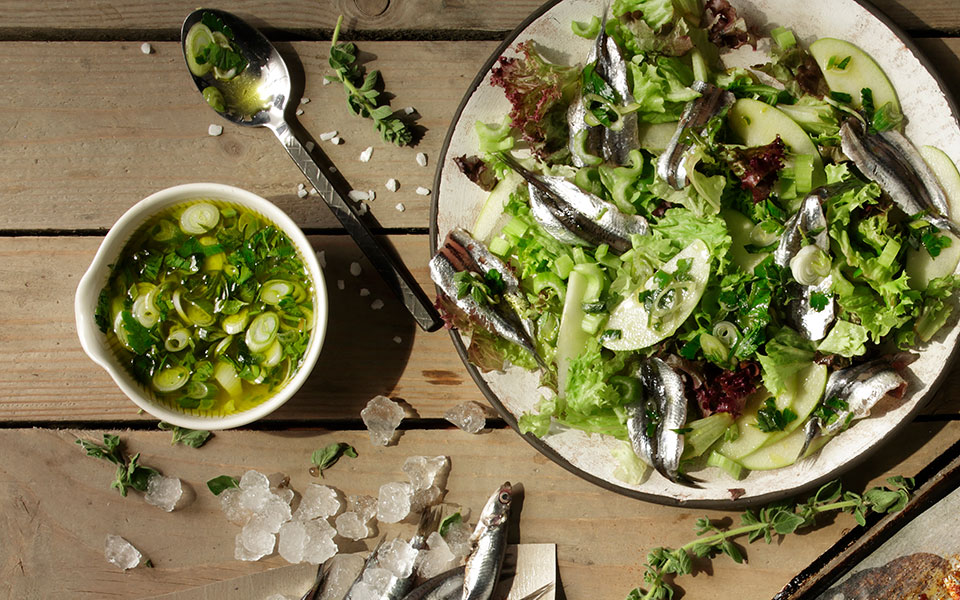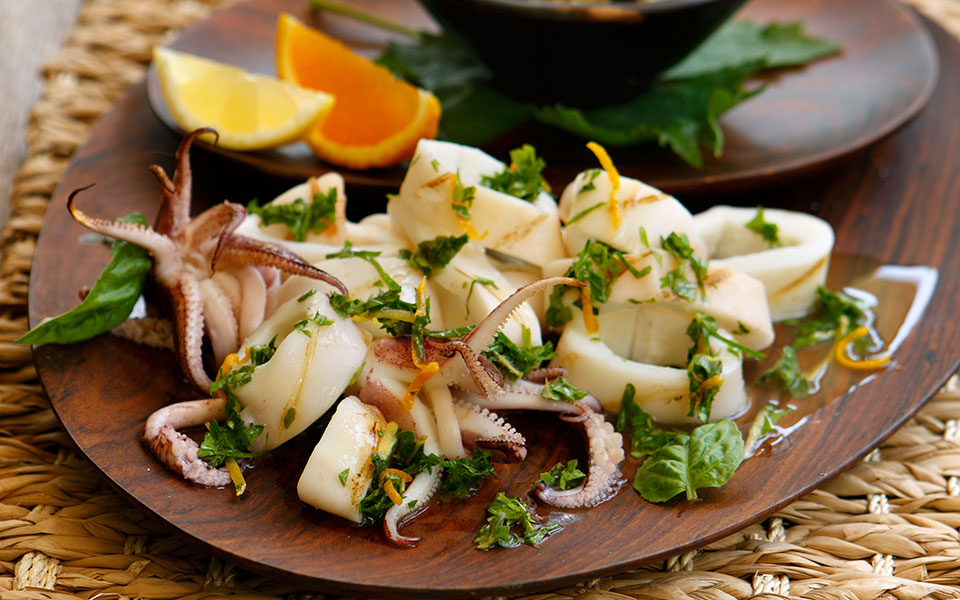Meet the Souvlaki Wrapper Who’s Served Athens for...
Discover how Christos, Athens’ master souvlaki...

© Shutterstock
Some say food tastes best when enjoyed in its natural setting, and we agree. When we think about the best grilled squid we ever had, the dish is accompanied with an image of a table by the sea, afternoon sun and tanned skin. But that’s a two-way street; food has the ability to reawaken memories and nostalgia, and take you back to some of the best moments of life.
So even if you can’t have your seafood on a Greek island today, you can still have a delicious dish made according to an authentic recipe. And if you close your eyes, we bet you’ll be able to smell the Aegean.

Cured Sardines with Fresh Herb Sauce
© Giorgos Drakopoulos
Recipe by Nena Ismyrnoglou
Delicate, delicious, and light, this meal is perfect for lunch on a sunny summer day. Make it with herring or any kind of sardine. Anchovies work beautifully as well.
Steps:
1. Add a thin layer of salt to a glass container and place 1/4 of the sardine fillets on top in a single layer, with the skin up. Cover with another thin layer of salt, and then another layer of sardines. Do the same with another two layers.
2. Place a plate on top of the fish, and something heavy on top of the plate (such as a full jar), to add pressure. Place uncovered in the fridge for at least two hours and up to two days, depending on how salted you want the fish.
3. To make the sauce, stir together all the ingredients in a bowl. Don’t make it more than two hours before you want to serve it for optimum flavor.
4. To serve, briefly rinse the fish under running water, and immediately pat dry with kitchen towels. Place on a serving platter along with the sauce.
After rinsing, the sardines can be stored in oil, in a closed container in the fridge, for 3-4 days.
This recipe was first published in Greek here.
400 g fresh sardines, cleaned and filleted
100 g coarse salt
for the sauce:
60 ml olive oil
60 ml lemon juice
1 tbsp. white wine vinegar
1 fresh red chili pepper, finely chopped (or 1/4 tsp cayenne pepper)
1 tbsp. fresh oregano leaves (or 1 tsp. dried)
3 tbsp. coarsely chopped parsley leaves
1 tbsp. scallions, finely chopped
1 clove of garlic, slightly crushed
salt and freshly ground pepper

Lobster "Giouvetsi"
© Nikos Kokkas
Lobster wasn’t always considered a luxurious food. The fishermen in the village of Sigri, on Lesvos, used to toss them back into the sea when they got caught in their nets. This recipe from Sigri is uncomplicated, without dressy accent flavors or American influences, and absolutely scrumptious. If you don’t have access to ouzo, a bit of fennel could do the trick.
Steps:
1. Add the lobsters to a pot with enough water to cover them, and boil over high heat for about 15 minutes.
2. Remove the lobsters from the pot and let them cool, but keep the water hot.
3. Heat the olive oil over medium heat in another pot. Sauté the onions, the basil or parsley, the garlic, the pepper, and the red chili flakes for about 5 minutes, or until the vegetables are softened.
4. Cut the lobster roughly, without removing their shell (!), and add them to the mix. Add the butter, salt and pepper. Stir and cook for another 5 minutes, then add the ouzo. Cook for another 2-3 minutes, until the alcohol has evaporated.
5. Remove the lobster from the pot and set it aside. Add the tomato sauce and 2 cups of the hot water from the other pot. Once it boils, add the orzo, stir, and lower the heat. Cook for 15-20 minutes, or until the orzo is done.
6. Add the lobster back into the pot (the locals of Lesvos keep the shells, but you can remove them if you prefer). Mix well, and serve immediately.
This recipe was first published in Greek here.
2 small lobsters (ca. 1/2 kg each)
2 onions, finely chopped
250 g orzo
5 tbsp. fresh basil or parsley leaves, finely chopped
2 cloves of garlic, finely chopped
1 red pepper
1 tbsp. butter
40 ml ouzo
250 ml tomato sauce
1 tsp. red chili flakes (or to taste)
100 ml olive oil
salt and freshly ground pepper

Grilled Squid
© Giorgos Drakopoulos
750 g fresh or frozen whole squid, cleaned, with the tentacles separated from the body
2 tbsp. olive oil
2 tbsp. orange juice
1 tbsp. lemon juice
1/2 tsp. zest from the fruits
4 tbsp. fresh herbs (such as parsley, oregano, thyme and basil), finely chopped
a little bit of salt
freshly ground pepper
Recipe by Nena Ismyrnoglou
Squid on the grill is a Greek summer essential, and the smell while it’s cooking is guaranteed to bring back memories of tavernas where the freshly caught seafood is sizzling on simple outdoor coal grills. The orange juice in this recipe adds a lovely citrusy flavor.
Steps:
1. Heat your grill well (for about 10 minutes), on its highest setting. Grease the squid with about 1 tablespoon of the oil, and grill over indirect heat for 3-4 minutes on each side. The tentacles take a little longer than the body.
2. Cut the body into thin rings and place them in a bowl. Add the rest of the oil, citrus juice and zest, herbs, salt and pepper. Mix well.
3. Serve with a nice seasonal salad.
This recipe was first published in Greek here.
Discover how Christos, Athens’ master souvlaki...
Three traditional products serve as both...
From postmodern bougatsa to wood-fired pizza...
Athens sizzles with culinary creativity, blending...